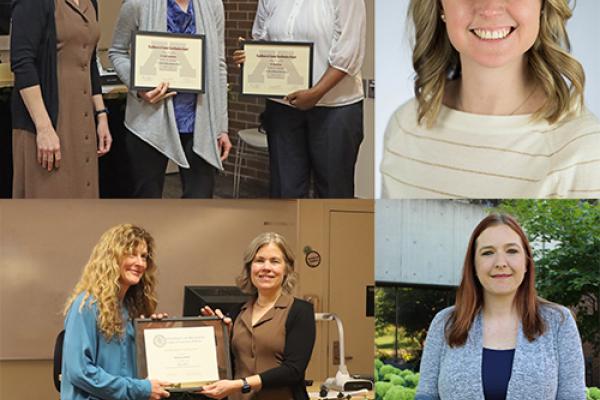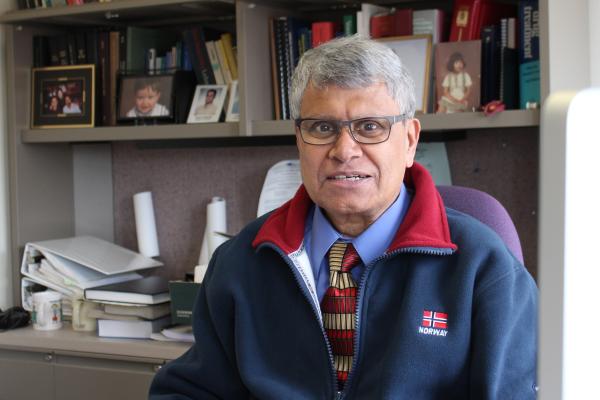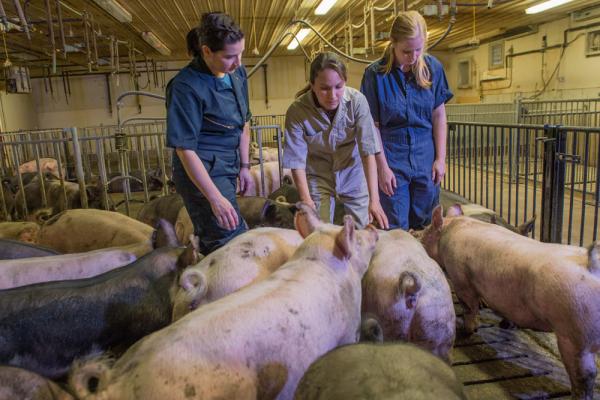DNIC celebrating Black History Month
March 1, 2021
This year, in honor of Black History Month, the American Association of Equine Practitioners highlighted the work of Dr. Amie Casey, an African-American woman and regulatory veterinarian for the Louisiana State Racing Commission who has worked in equine medicine for 20 years. Dr. Casey is also the granddaughter of Hall of Fame jockey and Kentucky Derby winner Jimmy Winkfield. While stories such as Dr. Casey’s exist, they are few and far-between.
This year, we were lucky enough to sit down (virtually and socially distanced) with Sarah Penn, CVT, and Dr. Abi Maynard, current and previous members of the UMN VMC community, respectively, to discuss their experiences as Black women participating or working in the equine and large animal community.
 Sarah Penn, riding Kokomo who is owned by Kelly Murphy
Sarah Penn, riding Kokomo who is owned by Kelly Murphy
Sarah Penn
Sarah Penn recently re-ignited her passion for equine sports. Sarah is a Patient Care Coordinator for the Lewis Small Animal Hospital and also completes phone triage for the small animal emergency medicine and critical care service. She received her CVT degree from the Medical Institute of Minnesota. This May will be Sarah’s 19th year with the UMN VMC and she recently won the Charlotte Striebel Equity Award from the U of M Women’s Center and the CVM’s Excellence in Diversity and Inclusion award.
Sarah was born in Texas but was adopted and raised in Minnesota. She was first exposed to equine sports while spending time at her parents’ cabin around the age of 11. She was hooked after completing a few trail rides and babysat to save money for horse camp two summers in a row. Trail riding continued during her teenage years and Sarah began to take English saddle lessons in her 20’s. However, she says that riding ultimately “slipped away.”
“I was a larger rider and had experienced size-bias from people. Although, when taking lessons I was riding a larger horse and there were no people of color around,” she says. “Cost was certainly a factor as I got more responsibilities in life as well.”
Sarah was exposed to equine and large animal medicine in technical school to a small degree, but opportunities for large animal technicians are much more limited and most of the training is small animal-focused. After meeting her biological family in 2018, Sarah re-discovered riding after an almost 20-year absence. It turns out, Sarah was destined to ride horses as her biological father has been a professional horseman and cattleman his entire life in Texas. He also participated in competitive reigning and drill teams. Seeing how a love of horses ran in her bloodlines, Sarah was inspired to reach out to a friend who is also a plus-size rider to find the support she needed. She has been riding again for two years now, and leases a friend’s Draft-cross mare while taking dressage lessons. She hopes to volunteer at an endurance ride event this summer, depending on necessary COVID precautions.
Sarah and I discussed the lack of Black representation in horse culture in Minnesota and she wanted to make clear that there are regional differences across the US, with more representation in the South and Southwest. “Black people are not separate from horses,” she says. “Here in Minnesota, there are not a lot of Black riders.” She also brought up that Black people and horses have been linked since their arrival in this country. For instance,Black jockeys were prominent during the early years of horse racing, winning many Kentucky Derbys. However, they were pushed out of the sport over time by whites once the lucrative nature of being a jockey was noted. She points to more representation, recently on social media, of Black equestrians and cowboys, especially related to protests of the murder of George Floyd and voter protection.
We also discussed the trend of highlighting Black excellence during Black History Month as only those individuals who are at the tops of their fields, education, or sport. But to Sarah, Black excellence has another meaning — it’s her presence as a rider who doesn’t fit the typical norm in Minnesota in relation to size and race. “I am taking my place in the equestrian world and that is the difference this time,” she says. “I decided I was going to make room for myself in a sport that doesn’t have a lot of representation for people that look like me. Going in, I knew what I wanted and was going to have despite the community not being there yet.”
Sarah’s presence and visibility has led to positive change around her. She is most proud of her Black friends, especially Black women, reaching out and telling her how proud of her they are and how they want to get into riding themselves. “This is the true beauty of this experience,” Sarah says. Recently, a picture of Sarah riding was noticed on Facebook by Irideon Riding Wear. The company featured this photo of Sarah wearing her Irideon breeches in one of their online ads. It’s easy to imagine innumerable riders being inspired by this simple act of representation.

Abi Maynard, DVM
Abi Maynard
Abi Maynard, DVM, is a 2017 graduate of St. George’s University School of Veterinary Medicine, where she also obtained her BSc. Abi completed her clinical year here at the University of Minnesota. Abi was born and raised in Barbados, an island nation in the Carribean. Her initial interest in veterinary medicine stemmed from visiting her uncle’s farm, which was filled with a variety of animals. Abi has always been interested in mixed animal medicine and had a particular affinity for horses. However, growing up in Barbados, a large portion of equine sports was predominantly white and outside of her family’s social class. Horse riding was limited to special events, such as her birthday.
Abi started shadowing a local veterinarian at a very young age, but similar to veterinary medicine in the US, most veterinarians in Barbados are white and mentorship from Black veterinarians was lacking. Abi recalls her first day of veterinary school letting her classmates know that her life dream was to be an equine veterinarian for a Sheikh in Dubai. However, not being steeped in the equine community, she struggled to find mentors to work towards this dream.
During her second year in vet school, a family member put her in contact with a family friend who happened to be a Black veterinarian from Barbados who had practiced equine medicine. However, this communication did not go as planned as he essentially told Abi her chance of making it in the equine veterinary world as a Black person was unlikely, even more so as a Black woman, and this family friend himself had left equine practice for academia. This conversation led Abi to switch her focus to mixed animal practice.
Abi’s memories from her pre-vet and veterinary school experiences are generally rooted in being the only Black person in the room, especially in large animal medicine. This experience continued at the University of Minnesota. “I cannot express how much just seeing Sarah Penn, Dr. Jody Lulich, Monique Rambo, or Rosemary Klass meant to me,” she says. “But all of those people are in the small animal hospital.”
Most of Abi’s external rotations continued this pattern as well, including her public health experiences, with the few people of color she encountered not being involved with veterinary care. Abi does describe being blown away after meeting and seeing Dr. Stephan Schaefbauer, another Black woman and local veterinarian in charge for the USDA-APHIS in Minnesota. But the two did not have a chance to discuss Dr. Schaefbauer’s experiences or journey.
After veterinary school, Abi’s main goal was to work for the USDA. However, this was not an option at the time as she had not obtained US citizenship, although she is a US citizen as of last year. So, Abi decided to practice mixed animal medicine. She got a job in rural Tennessee in mixed animal practice. Again, Abi was generally the only Black person in the room, both at her veterinary clinic and out on farm calls. She recalls episodes of both casual and overt racism in her clinic and out on farms. “In Tennessee, I didn’t feel like I had the room or voice to bring up things like casual racism because my experience would have been the singularity and there wouldn’t have been much understanding.”
Ultimately, due to these toxic experiences, Abi left Tennessee and mixed animal practice after two and half years despite loving the variability of mixed animal medicine. She is currently a small animal practitioner in St. Paul with hopes of eventually becoming a public health veterinarian and moving back to Barbados to apply her skills to shape their veterinary public health infrastructure. Unfortunately, her passion for equine and mixed animal medicine has abated as she doesn’t want to exist in spaces where she feels she has to validate her presence.
Abi is still the only Black person at her current job, but she describes being more comfortable talking about racism and her experiences in Minneapolis compared to Tennessee. And she is able to interact with Black clients and community members much more than in Tennessee. Abi even described a client, who was also Black and cried tears of joy after meeting Abi, her first Black veterinarian. “My experience is my experience and lack of resources not being from this country made things harder,” Abi clarifies. But, she says, she has seen other members of the Black community succeed in the large animal and equine world across social media. Abi also wants to serve as a mentor for other minority veterinary students and can be reached at [email protected].
While both Sarah and Abi’s experiences are specific to them as individuals, many aspects of their journeys are likely relatable for many. Sarah and Abi’s experiences highlight the need for increased representation and opportunities for Black people and other minorities in both the smallandequine/large animal communities whether inveterinary medicine or sport.Over the past year especially, tough conversations are finally being had and slow changes are being made, especially in regards to veterinary education, but increased awareness is slowly reaching the profession as a whole. Organizations such as the National Association for Black Veterinarians and Multicultural Veterinary Medical Associationare at the forefront working for equity and diversity in the veterinary community, but this work cannot be completed without the support of the profession as a whole. We thank Sarah and Abi for sharing their stories and being so candid. Committing to creating a more equitable, just, and diverse profession is one way we all can honor Black History Month.


